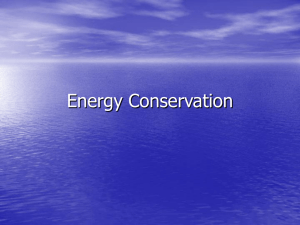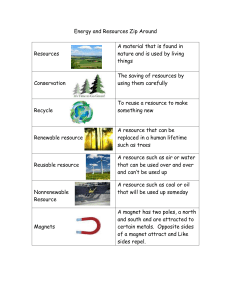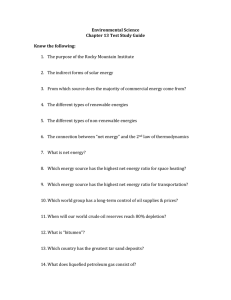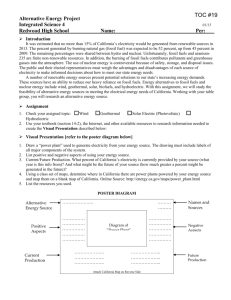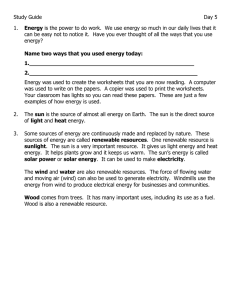Sustainable Energy
advertisement
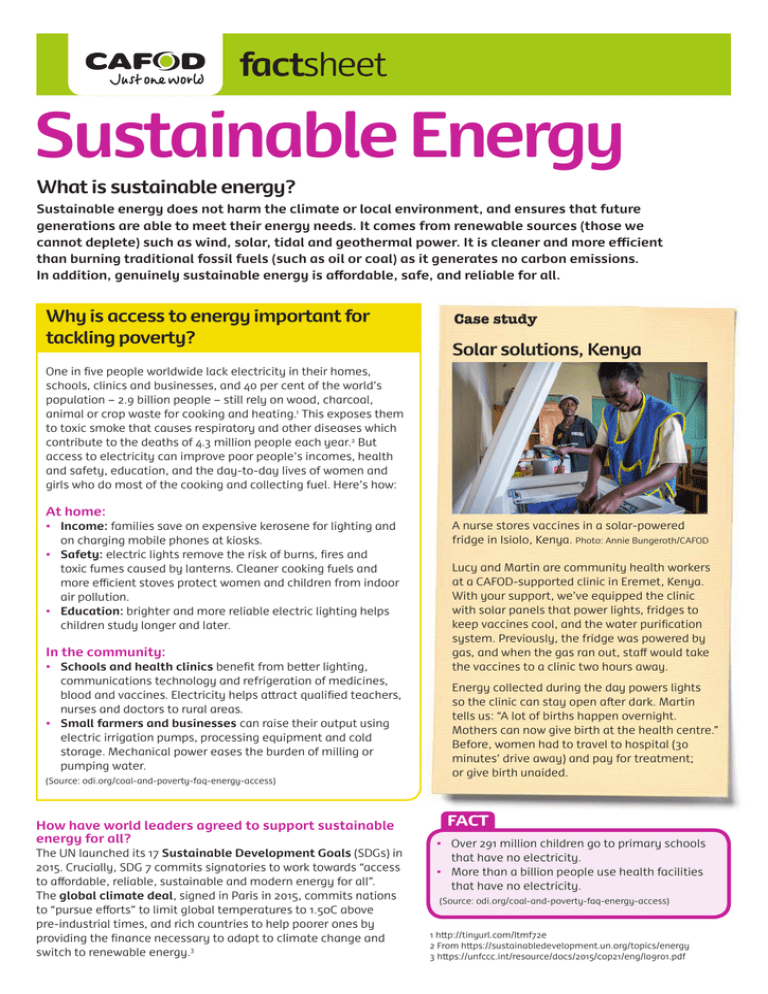
factsheet Sustainable Energy What is sustainable energy? Sustainable energy does not harm the climate or local environment, and ensures that future generations are able to meet their energy needs. It comes from renewable sources (those we cannot deplete) such as wind, solar, tidal and geothermal power. It is cleaner and more efficient than burning traditional fossil fuels (such as oil or coal) as it generates no carbon emissions. In addition, genuinely sustainable energy is affordable, safe, and reliable for all. Why is access to energy important for tackling poverty? Case study Solar solutions, Kenya One in five people worldwide lack electricity in their homes, schools, clinics and businesses, and 40 per cent of the world’s population – 2.9 billion people – still rely on wood, charcoal, animal or crop waste for cooking and heating.1 This exposes them to toxic smoke that causes respiratory and other diseases which contribute to the deaths of 4.3 million people each year.2 But access to electricity can improve poor people’s incomes, health and safety, education, and the day-to-day lives of women and girls who do most of the cooking and collecting fuel. Here’s how: At home: • Income: families save on expensive kerosene for lighting and on charging mobile phones at kiosks. • Safety: electric lights remove the risk of burns, fires and toxic fumes caused by lanterns. Cleaner cooking fuels and more efficient stoves protect women and children from indoor air pollution. • Education: brighter and more reliable electric lighting helps children study longer and later. In the community: • Schools and health clinics benefit from better lighting, communications technology and refrigeration of medicines, blood and vaccines. Electricity helps attract qualified teachers, nurses and doctors to rural areas. • Small farmers and businesses can raise their output using electric irrigation pumps, processing equipment and cold storage. Mechanical power eases the burden of milling or pumping water. (Source: odi.org/coal-and-poverty-faq-energy-access) How have world leaders agreed to support sustainable energy for all? The UN launched its 17 Sustainable Development Goals (SDGs) in 2015. Crucially, SDG 7 commits signatories to work towards “access to affordable, reliable, sustainable and modern energy for all”. The global climate deal, signed in Paris in 2015, commits nations to “pursue efforts” to limit global temperatures to 1.5oC above pre-industrial times, and rich countries to help poorer ones by providing the finance necessary to adapt to climate change and switch to renewable energy.3 A nurse stores vaccines in a solar-powered fridge in Isiolo, Kenya. Photo: Annie Bungeroth/CAFOD Lucy and Martin are community health workers at a CAFOD-supported clinic in Eremet, Kenya. With your support, we’ve equipped the clinic with solar panels that power lights, fridges to keep vaccines cool, and the water purification system. Previously, the fridge was powered by gas, and when the gas ran out, staff would take the vaccines to a clinic two hours away. Energy collected during the day powers lights so the clinic can stay open after dark. Martin tells us: “A lot of births happen overnight. Mothers can now give birth at the health centre.” Before, women had to travel to hospital (30 minutes’ drive away) and pay for treatment; or give birth unaided. FACT • Over 291 million children go to primary schools that have no electricity. • More than a billion people use health facilities that have no electricity. (Source: odi.org/coal-and-poverty-faq-energy-access) 1 http://tinyurl.com/ltmf72e 2 From https://sustainabledevelopment.un.org/topics/energy 3 https://unfccc.int/resource/docs/2015/cop21/eng/l09r01.pdf Do poor countries need fossil fuels to develop? Developing countries need energy to reduce poverty and develop economically, and sustainable energy sources are as affordable as fossil fuels and less damaging to the climate, local environment and health. Local, renewable sources of energy are the most affordable way of reaching the poorest people – they most often live in very rural areas, and extending the energy grid would in most cases be too expensive, take too long and be politically challenging. We know that technology based on fossil fuels … needs to be progressively replaced without delay. Pope Francis, Laudato Si’ - On Care for Our Common Home What needs to change? Research by CAFOD and the Overseas Development Institute reveals that the UK government spends billions of pounds on fossil fuel projects overseas – more than double that given to renewable energy projects. Richer countries like the UK must help poorer countries to tackle climate change, which hits poorer countries hardest, and to develop their energy services in a way that does not lock them in to using outdated, polluting fossil fuels systems. Pope Francis also reminds us of the need to care for our common home, and each other. In the UK we can stand in solidarity with those living without the energy they need– and crucially, limit our own impact on the planet – by switching to renewable energy. What is CAFOD doing? • Encouraging people to ask politicians to shift support from fossil fuels to sustainable energy and to work towards achieving SDG7 on universal access to energy by 2030 • Working with local partners to improve access to renewable power for the poorest communities • Carrying out research to monitor if and how the UK and other international bodies are meeting their climate and poverty commitments • Calling on people in England and Wales to switch their home energy supply to renewable energy providers Try these: • Live without using electricity for a day – or maybe just an hour! • Order our free Laudato Si’ study guide at cafod.org.uk/encyclical • Switch your home energy supplier to Ecotricity and they’ll donate up to £75 to CAFOD ecotricity.org.uk/cafodtogether • Apply for the livesimply award for your school, parish, retreat centre or chaplaincy, cafod.org.uk/livesimply Did you know…? • Fossil fuel plants can take years to build, while a whole solar plant can built in as little as three months. • Extending an energy grid does not necessarily mean electricity for poor households as they often face unaffordable connection costs. • Once a wind or solar project is built, the extra cost of generating electricity is almost zero. • It’s a myth that energy sources like wind and solar only generate electricity on windy or sunny days. Case study Who benefits from Colombia’s fossil fuels? In Boquerón, Colombia, coal mining was expected to bring prosperity, but it hasn’t worked out that way. Large explosions to expose the coal have left craters several kilometres wide and damaged nearby houses. As a result of air pollution, in 2010 the Colombian government ordered 1,700 people in Boquerón and two neighbouring towns to leave their homes. Clorinda Martínez, a former cotton picker, says: “We used to drink the rain water, but now we can’t drink it, because you can see the coal dust at the bottom of the containers.” The people of Boquerón have not benefitted from the coal produced on their doorstep, because it is exported. In 2012 the UK alone imported 11.2m tonnes of Colombian coal – the majority of which was burned to generate electricity for UK homes and businesses. Boquerón’s people say their own electricity access is irregular, and at times unsafe, while their bills are sporadic and very high. Quite frankly, there is no answer to climate change without substantially, dramatically, increasing the amount of renewable energy in the global energy system. Christiana Figueres, Executive Secretary of the UN Framework Convention on Climate Change Useful websites odi.org/coal-and-poverty-faq-energy-access sustainabledevelopment.un.org se4all.org cafod.org.uk/Policy CAF 3272 The Catholic Agency for International Development (CAFOD) is the official aid agency of the Catholic Church in England and Wales, and part of Caritas International. Registered charity number 1160384, company no 09387398
